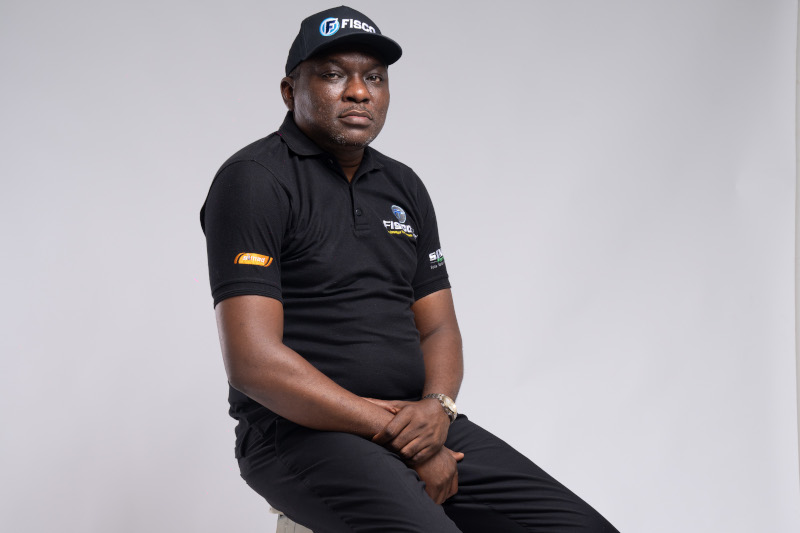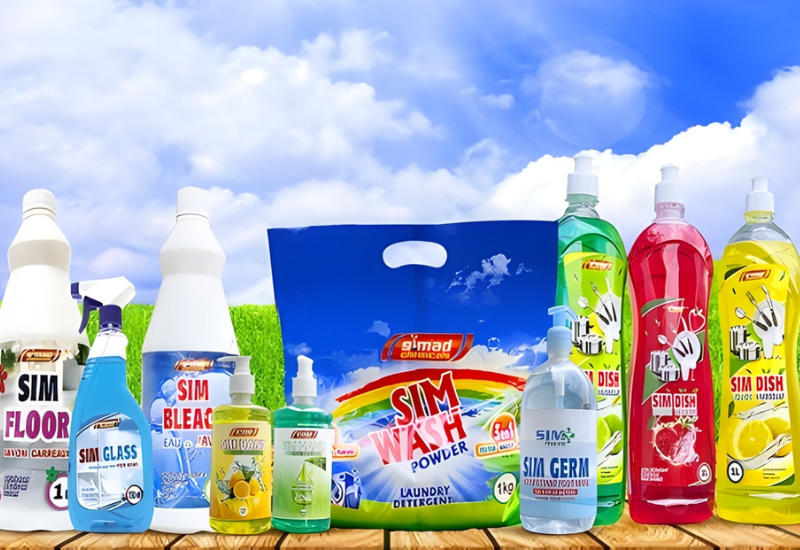
Joël Sikam
Interview with Joël Sikam
FOUNDER and CEO, FISCO INDUSTRIES
Lives in: Douala, Cameroon
Joël Sikam is the founder and CEO of Fisco Industries, a manufacturer of home and personal cleaning products in Cameroon. His ambition is to build Africa’s equivalent of Procter & Gamble, the American multinational behind household staples such as Ariel, Pampers and Gillette.
Today, Fisco produces about four million litres of cleaning products a year and sells over 40 items across two brands: Simad, for homecare products like laundry detergent, dishwashing liquid, bleach and floor cleaner; and SimPharma, for personal cleaning products such as hand sanitiser, shower gel and shampoo.
From finance to factory floor
Born in Cameroon, Sikam left for France as a teenager to complete high school, later moving to the United States. He began at a community college in Dallas before transferring to the University of North Texas, where he earned a finance degree in 2010.
He joined Saxon Mortgage, then owned by Morgan Stanley, managing mortgage accounts for banks and homeowners.
But as more Africans from the diaspora began returning home, Sikam decided he didn’t want to watch from afar. Cameroon, he believed, offered greater opportunity than the mature US market.
In 2011, he abandoned his green card application and returned to Douala, Cameroon’s commercial capital.
His entry into the cleaning products business came through contacts in Texas, a hub for the US oil industry. Some of his former classmates worked for international oil companies operating in Africa. They connected him to their regional representatives.
Through these connections, he learned how to register as a supplier. Offshore oil rigs and vessels – where crews live for months – need a steady supply of cleaning goods, often sourced through tenders. Sikam began submitting bids and eventually won contracts.
Then the 2014 oil price collapse hit. Crude plunged from over $100 to below $30 a barrel by early 2016. Exploration in Africa slowed sharply, wiping out most of his business.
Sikam saw a way to adapt. The industrial cleaning products he had supplied to oil companies could be reformulated for households.
In 2015, at just over 30 years old, he founded Fisco Industries to manufacture affordable, mass-market cleaning products.
The company started small, financed entirely with Sikam’s own capital. Fisco’s initial range included seven cleaning products, among them bleach, dishwashing liquid, and floor cleaner.
But early on, the company ran into a major problem: its cleaning products kept coming out watery. The team followed the formulations carefully, but the result was the same each time. Unsure of the cause, Sikam brought in a consultant from Poland to investigate. By that stage, the company had already put a significant amount of its limited capital into raw materials – only to find that the finished products couldn’t be sold. “I lost a lot of money due to the formulation,” Sikam says.
The consultant suggested that they test the water used in production and found that Douala’s supply had a very high iron content, which interfered with the formulations. They also discovered that the city’s high humidity was affecting the product. In response, the company bought a demineraliser to treat its water and made slight adjustments to the formulations. Sikam estimates these production setbacks cost him nearly a year.
At first, manufacturing was limited to about ten boxes a day. Sales were mostly to people Sikam knew – family and friends who bought the products partly out of support, since the price was affordable.

A selection of cleaning products manufactured by Fisco.
Breaking into retail
Once Fisco had its production up and running, the company began approaching informal retailers operating in traditional markets – the bustling marketplaces found throughout Africa where shoppers can bargain over prices. Sikam estimates that in 2015, these vendors accounted for as much as 70% of retail sales in Douala. At the time, he says, there were only about ten modern, air-conditioned grocery stores in the city.
Working with informal vendors, however, proved difficult. Many shopkeepers didn’t keep proper inventory records and made little effort to promote Fisco’s products, which were still unfamiliar to customers. Instead, they focused on pushing well-known brands that shoppers already recognised.
It was hard for Fisco to track what prices vendors were charging. Because the company’s products were not yet established, most insisted on paying only after they had sold the stock – and collecting those payments was often a struggle. When Fisco’s sales team visited to collect payment, vendors would frequently claim they didn’t have the money, often citing family emergencies, and ask them to return the following week.
As challenges with traditional retailers persisted, Sikam gradually shifted his focus toward modern grocery chains, many of which still sourced their detergents from abroad. But working with them presented a new set of challenges.
His first stop was one of Cameroon’s largest supermarket chains. When he met the purchasing manager, she turned him down.
Still, Sikam refused to give up. He approached another foreign-owned supermarket and decided to present a stronger business case. He offered the retailer a 30% profit margin between his selling price and their retail price, along with 60 days to pay. These terms were far more attractive than those for the Asian detergents they had been importing at the time, which required full payment upfront, followed by a 30-day production period and another month for shipping by sea.
This time, his persistence paid off. A few days later, the purchasing manager’s assistant called and asked him to come and collect his first purchase order.
That first order proved to be a turning point. Once Fisco’s products appeared on the shelves of a well-known supermarket chain, it became far easier to approach others. The association with a reputable retailer gave the company credibility, and soon some supermarkets began contacting Fisco directly.
Regional ambitions
In pursuit of his goal to build the Procter & Gamble of Africa, Sikam has cast his ambitions beyond Cameroon. Much of Fisco’s early international expansion happened organically. As Douala serves as a commercial hub for Central Africa, traders regularly travel there from neighbouring countries such as Chad, Equatorial Guinea, the Central African Republic, and Gabon to buy goods in bulk and transport them home. Many discovered Fisco’s products this way, helping the brand reach new markets with little direct effort from Sikam.
Now, Sikam is pursuing a more deliberate regional strategy. In 2023, he completed the Stanford Seed programme at Stanford University, which provides training and support to African entrepreneurs. During the programme, he met an entrepreneur from Côte d’Ivoire, with whom he has partnered to launch Fisco’s detergents in that market. The company is already distributing there on a small scale, with plans to begin local production in the near future. Sikam has also identified a potential partner in the Democratic Republic of Congo and is exploring opportunities there.
Sikam says his strategy for expanding into new markets is to first find local partners, then begin exporting from Cameroon to build brand recognition, and, once the products gain traction, to establish local manufacturing through joint ventures.
Fisco CEO Joel Sikam’s contact information
Contact details are only visible to our Monthly/Annual subscribers. Subscribe here.



